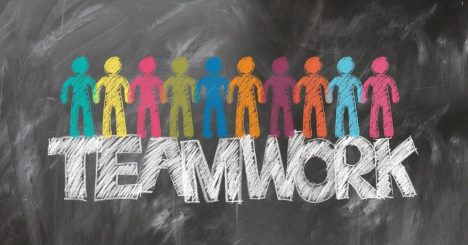Relationships never die a natural death….
They are murdered by ego, attitude, and ignorance
-Buddha
The actions and behaviors displayed while at work can either make or break work place relationships with coworkers, supervisors, and upper management. Effective work relationships form the foundation for possible promotions, increase in salary, achieving work goals, and overall job satisfaction, not to mention the chance to make an amazing friend or two. Creating an optimistic, empowering, and motivational work environment is guaranteed to be beneficial and life enhancing.
Effective Interpersonal Communication can help productivity in the workplace, aid in building strong and positive relationships with colleagues, supervisors, administration, and management while positively supporting company team goals and projects smoothly and effectively. Interpersonal Communication can either positively or negatively affect morale and/or personal productivity.
Being effective in interpersonal communication is an essential life skill that easily enables a more profound connection with people and contacts while setting respectable inner and outer boundaries. Effective Interpersonal Communication can also aid in maintaining good relationships with others while providing leadership and reassurance to those around.
It’s a beautiful life now is taking a look at “How to Create Successful Workplace Relationships by Being an Effective Interpersonal Communicator.”
Be Authentic

The one definition that stands out for being authentic when attempting to build workplace relationships is “to be true to one’s own personality, spirit, or character.” True authenticity when building workplace relationships should be genuine and approached with the right authentic intention in mind in order to build trust and have a relational workplace relationship as opposed to a transactional workplace relationship. Being an effective interpersonal communicator also requires authenticity in order to create and foster successful workplace relationships and increase overall productivity. Being an effective communicator requires not just being heard, but also listening. Listening to others helps them feel understood and valued. The trust built from being an engaged listener, authentic, trusting, and relational in the workplace can have a massive positive impact on all areas of life.
Be Realistic

Be realistic and know that attempting to be friends with and wanting to please and be liked by everyone in the workplace would be considered an unrealistic expectation. This behavior in the workplace may often be labeled as people pleasing and eventually be seen as an unauthentic and undesirable trait. As noted by Dr. Harriet B. Braiker in her book “The Disease to Please”, “people-pleasing is portraying a fake version of you, just to be liked. It’s a collection of flawed assumptions, patterns of behavior, and feelings that push you towards self-sacrifice in everyday situations
Kindness, however, comes from a place of strength and confidence. People-pleasing comes from a fear of confrontation and disapproval.”
Kindness and people pleasing are often seen as the same at first experience as they can appear similar, but these two traits are completely different. Kindness aids in building relational work place relationships while people pleasing aids in building transactional work place relationships.
Be Accepting

-Audra Lorde
Social acceptance is a basic human need to belong. To be accepting and to avoid making presumptions and assumptions about people in the workplace could be beneficial to building successful workplace relationships while being effective in interpersonal communications. Jumping to conclusions about people can be misleading and cut off a positive relationship before the relationship has had a chance to begin. Acceptance and understanding go hand in hand. To be an effective communicator requires an open and honest approach without any preconceived notions. Acceptance requires a level of emotional intelligence to build lasting professional relationships.
Working together productively and professionally while accepting and appreciating another person’s qualities and values helps in fostering effective communication and positive work place relationships.
Be an active listener
 Being an active listener means being aware and focusing on what is being said. Active listening seeks to understand people and situations before responding. While listening abilities can vary from person to person, an active listener makes a conscious decision to listen and understand without judgement. Active listening is a skill and can be acquired with time and patience.
Being an active listener means being aware and focusing on what is being said. Active listening seeks to understand people and situations before responding. While listening abilities can vary from person to person, an active listener makes a conscious decision to listen and understand without judgement. Active listening is a skill and can be acquired with time and patience.
A popular study conducted by Faye Doell in 2003, which is noted in the article “Active Listening, the Key to Strong Workplace Relationships, Productivity, and Personal Empowerment”, showed that there are two types of listening: ‘listening to understand’ and ‘listening to respond’. The study found that “those who “listen to understand” have greater satisfaction in their interpersonal relationships than others. While people may think they might be listening to understand, what they’re really doing is waiting to respond.” People who listen to understand form better relationships and are more empathetic in their approach.
In his uber-popular book “The 7 Habits of Highly Effective People”, Stephen R. Covey explains that “real relationships are created and real solutions are found when people are willing to listen with the intent to understand. This requires us to suspend our judgments or biases long enough to listen, understand and show that we really understand by repeating what we heard — this is what’s known as active listening.”
Be Appreciative

Appreciation is a powerful relationship builder. Expressing appreciation and gratitude fosters a positive work environment and creates more pro social interactions. Recognizing and understanding the challenges of others in the workplace and appreciating each individuals role can led to more empathy, compassion, and authenticity, therefore opening an effective interpersonal communicative dialogue.
According to the Harvard Business Reviews article entitled “Why Employees Need Both Recognition and Appreciation” written by Mike Robbins, “Appreciation is about acknowledging a person’s inherent value. The point isn’t their accomplishments. It’s their worth as a colleague and a human being. When we show appreciation to our colleagues, customers, managers, and partners, we’re more likely to build trust and connect.
Being appreciative, accepting, and inclusive are some of the many ways to effectively build successful relationships, not only in the workplace, but also in life!
Be You
Mike Robbins, author of Bring Your Whole Self to Work, explains: “Regardless of where you work, what kind of work you do, or with whom you work—it’s possible to show more of your true self and become more satisfied, effective, and free.
Being yourself builds trust in relationships, improves teamwork, and boosts overall work experience.
Self-awareness is a critical component of being able to present yourself in an authentic way.
So, Be You!
“Today you are you, that is truer than true. There is no one alive who is youer than you”
-Dr. Seuss
Summary
Authenticity , being realistic, being accepting, being an active listener, be appreciative, and being yourself are all ways to be an active team player and create successful workplace relationships. Whether working remotely, in the office, or as a business owner, fostering positive relationships in the workplace increases productivity and personal work satisfaction.
Studies have shown that good interpersonal communication drives more employee recognition. When employees have good interpersonal relationships with each other and their managers, they are more likely to recognize each other’s good work and give constructive feedback. Overall, feeling and being supported in the workplace creates a win win situation for all.


